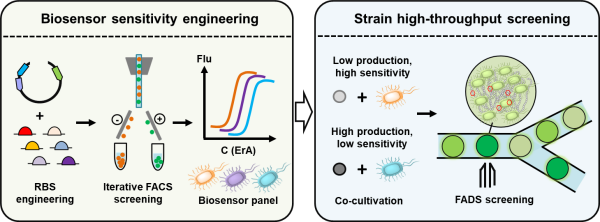Actinomycetes can produce a wide variety of secondary metabolites, and microbial fermentation is an important means for obtaining these natural products. For a specific target product, the yield from wild strains is generally insufficient to meet industrial production requirements, necessitating long-term strain domestication to enhance yield. The combination of small molecule biosensors and droplet microfluidics has been proven to be an effective method for the modification and high-throughput screening of actinomycete strains. However, during the strain domestication process, the yield of the target product often increases in stages, while most biosensors can only respond to target compounds within a certain operational range, making it difficult to support the multi-stage long-term domestication from wild strains to industrial strains. Therefore, different performance parameters of biosensors need to be matched at different stages of strain modification to achieve high-throughput screening.
Recently, a research team led by researcher Wang Meng from the High-Throughput Editing and Screening Platform Laboratory at the Tianjin Institute of Industrial Biotechnology, Chinese Academy of Sciences, obtained a series of biosensors with varying sensitivity and operational range through multiple rounds of iterative induction and screening of erythromycin biosensors. Through characterization experiments, the team demonstrated the correlation between the expression levels of transcriptional regulatory factors (TFs) and the sensitivity of biosensors, showing that regulating the expression levels of TF proteins is a quick and convenient method to alter the performance parameters of TF biosensors. To simulate the industrial strain domestication process, the team conducted droplet co-cultivation experiments starting from two erythromycin-producing strains with different yields, proving that the compatibility of biosensor performance parameters with the yield range of production strains is a prerequisite for successful screening, and they screened a mutant strain with a yield increase of 6.8 times from two different initial yield erythromycin-producing strain libraries. Genomic bioinformatics analysis enabled the team to identify multiple beneficial sites in the high-yield mutant strains to guide future rational metabolic engineering modifications.
The related research results were published in ACS Synthetic Biology. The research work was supported by the National Key R&D Program, the National Natural Science Foundation, major projects of the Synthetic Biology Haihe Laboratory, the Youth Innovation Promotion Association of the Chinese Academy of Sciences, and the Tianjin Synthetic Biotechnology Innovation Capability Improvement Action.

Modification and high-throughput screening process of small molecule biosensors
Source: Tianjin Institute of Industrial Biotechnology, Chinese Academy of Sciences

This account’s articles are defaulted to enable WeChat “Quick Reprint”.
Please indicate the source when reprinting.
For other channels, please contact us.